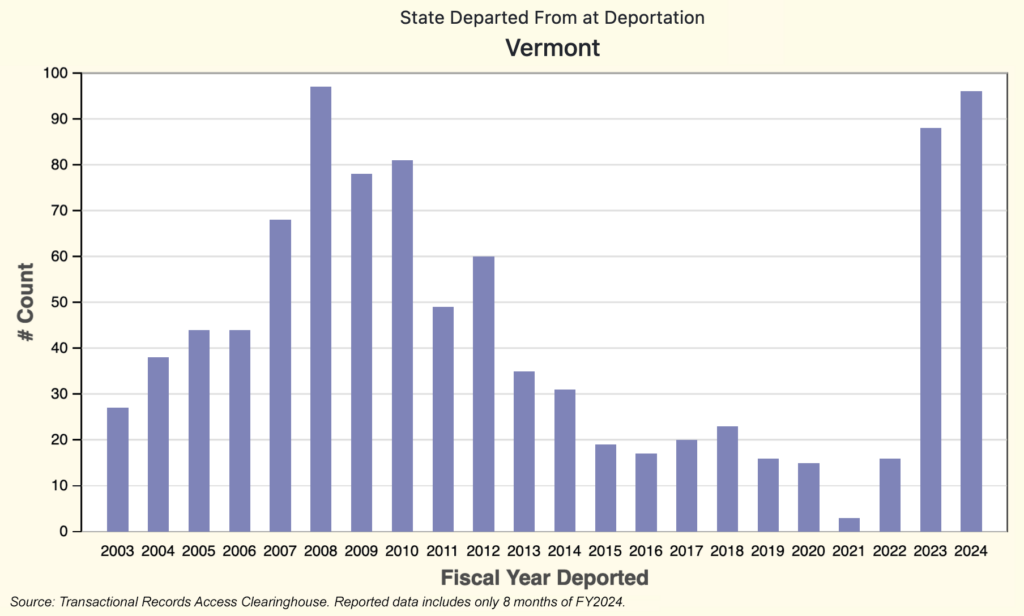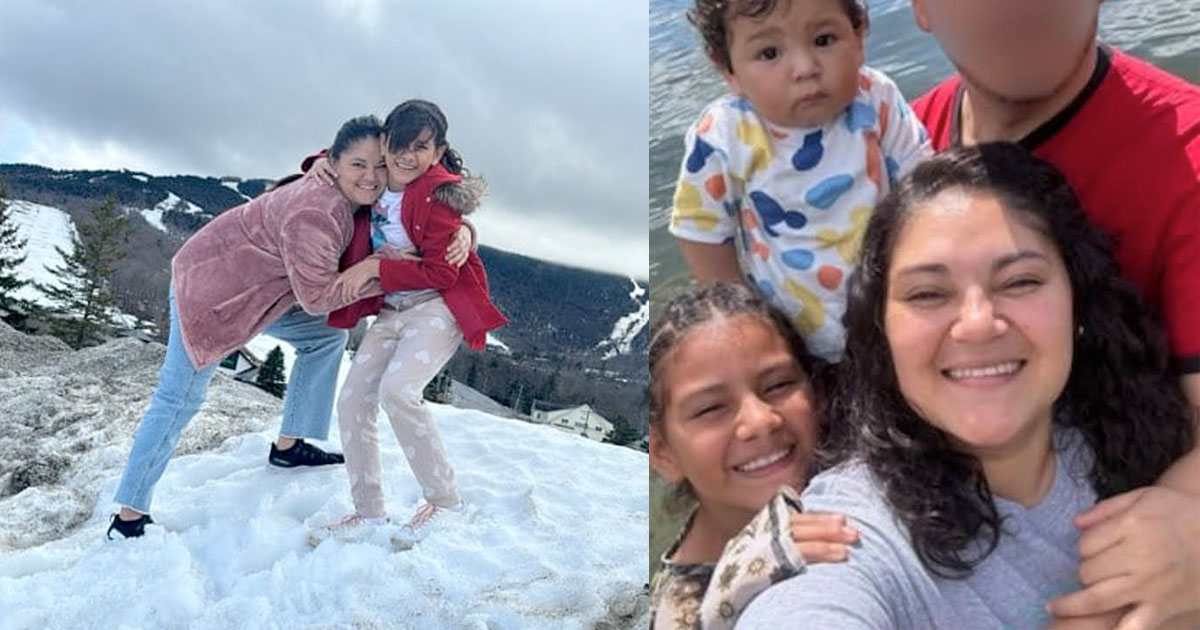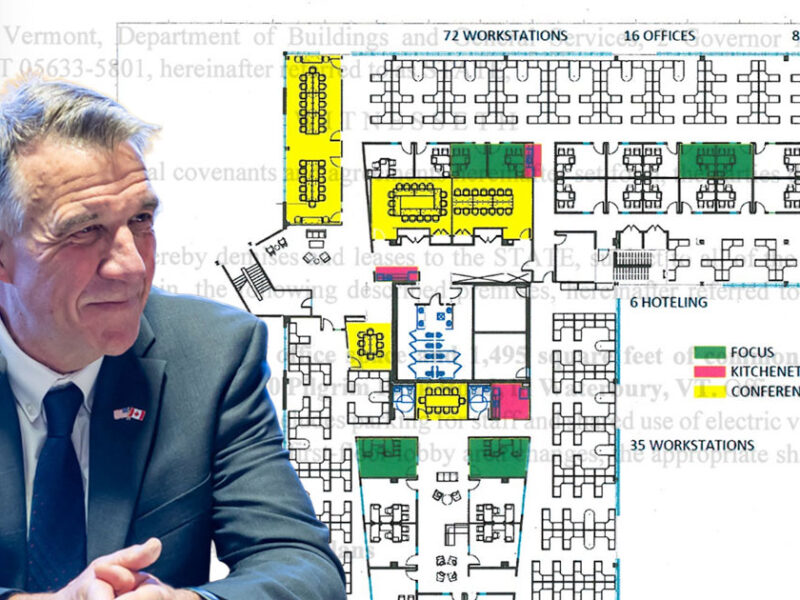On a warm July day, Greisy Mejia and her two young children entered the Department of Homeland Security’s St. Albans field office. She was told to expect a meeting with Immigration and Customs Enforcement (ICE) for a routine check-in to confirm custody of her children and possibly get her ankle monitor removed. Instead, she and her children were immediately detained and, the next day, deported to Honduras.
Mejia and her children first arrived in the United States in November 2023 at the Mexican border, fleeing gang violence in Honduras. Despite informing Border Patrol officers that she feared for her life, she was not granted the opportunity to file for asylum and was instead given an expedited summary deportation.
With her life still at risk in Honduras, she crossed the U.S. border again in February 2024 and was almost immediately kidnapped. “The kidnappers held them for weeks, abused them, and demanded $9,000 ransom from her family,” wrote Migrant Justice in a press release. “Greisy and her children were finally able to escape and reach a police officer in Uvalde, Texas.” The Uvalde police handed them over to the Border Patrol. The family was issued a summary reinstatement order, a deportation order issued to those who had previously crossed the border and been deported.
Instead of being detained until deportation, she was released under what’s known as an “order of supervision” because Mejia’s partner lives in Vermont and she was traveling with children. This meant she could travel to Vermont under the condition that she wear an ankle monitor and have frequent check-ins with local ICE agents.
Promising developments
Migrant Justice began assisting Mejia soon after she arrived in Vermont. Brett Stokes directs the Center for Justice Reform at Vermont Law and Graduate School and has been her attorney. Catalina Londono, a law school student at Vermont Law, was a legal fellow at Migrant Justice and served as Mejia’s case worker.
With Migrant Justice, Mejia built a game plan: she would first file for a stay of removal, then for a T visa, which can be granted to victims of human trafficking. Without a successful stay, ICE could technically deport her and her children at any time, a deep worry that Mejia carried with her since she arrived. And with a T visa, there was a path to employment, permanent residence, and, eventually, citizenship.
ICE held her Honduran passport, which was confiscated back in Texas, and her attorney needed a photocopy of it to file the stay of removal. Mejia went to the field office on July 3rd to pick it up. Londono accompanied her, and informed agents that they were planning to file a stay of removal. Upon handing over the photocopy, agents informed them that they were changing Mejia’s check-in schedule.
The bait and switch
According to Londono, ICE agents claimed they were first and foremost interested in confirming that the children were safe. As a result, they were moving her next check-in, which was supposed to be July 22nd, up to July 9th, just six days away. All Greisy would need to do was bring them to show that they were well and in her custody. According to Londono, agents suggested Mejia’s ankle monitor could be removed at that point.
“[ICE] really went above and beyond to reassure us,” Londono said. “And on top of that, they had said, ‘if we get all the information that we need for this upcoming appointment, she may not even have to come once a month, she may not even have to come every other month.’”
“It really felt like this was the best news. And Greisy, she said that it was like an early birthday present for her, that basically she left feeling like everything was going in the right direction,” Londono said. Mejia was born on the 4th of July.
Despite ICE assurances mere days earlier, Mejia and her children were seized and detained when they arrived on the 9th. Londono had accompanied them for this meeting too, and tried to file the stay of removal with agents there, but was refused. Attorney Brett Stokes arrived soon after to assist, but both were informed that such an application for a stay had to be filed four hours away in their Boston office.
As soon as Migrant Justice organizers heard what was happening, they put out an emergency call for people to converge on the St. Albans DHS building. Dozens showed up with banners and chants, demanding their immediate release. Instead, Mejia and her children were moved to another office, after which they were put on a plane and deported to Honduras.
Migrant Justice released a statement the next day:
Yesterday, July 9th, Greisy and her two kids reported to the ICE office. They remained in the waiting room for six hours, held without food, under the pretense that ICE would consider Greisy’s petition for relief. When agents finally appeared, they arrested Greisy, her nine-year-old daughter, and infant son.
The family’s attorneys at the Center for Justice Reform (CFJR) of Vermont Law and Graduate School attempted to file an emergency application for a “Stay of Removal” to stop their deportation, but ICE would not accept the application at its Vermont office. Instead, the agency put the family on a plane to Honduras, where they arrived this afternoon.
Will Lambek, a Migrant Justice member, said at the protest that this kind of deceptive practice is common. “ICE has brought people in for appointments in the past under false pretenses, like they did today, only to detain them.”
Since Mejia and her children were deported, they have been able to flee Honduras and are staying temporarily in Guatemala. Back stateside, Stokes has filed their T visa application, and will be filing a request to expedite the application process given Greisy’s circumstances.
Whether under Trump or Biden, the border policing regime endures
Stokes noted that despite some modest improvements in the first few Biden years, there has mostly been continuity between the Trump and Biden presidencies. “If I’m looking at the two, I don’t see a lot of difference. I still see people being detained, including in Vermont. I see an uptick from what I’m told had previously been the status quo in Vermont. I’m seeing a significant uptick in people being detained here.”
For the last two years, the Biden-Harris Administration has been ramping up deportation numbers — including here in Vermont. According to the latest data from Syracuse University’s Transactional Records Access Clearinghouse (TRAC), the Vermont deportation count is higher than it’s been since the end of the Bush Administration.

Meanwhile, removal orders — ordered deportations — have skyrocketed nationwide, surpassing Bush and Trump’s highest years.

On June 3rd, one month before Mejia was deported, the White House “took decisive new action to strengthen border security, announcing a series of measures that restrict asylum eligibility, and significantly increase the consequences for those who enter without authorization across the southern border.”
Aspects of the order, particularly its curtailing of the asylum process, may violate international law, according to Filippo Grandi, the U.N. high commissioner for refugees. Grandi was interviewed by the Associated Press in June, when he “cautioned that some aspects of the executive order may violate refugee protection required under international law.”
TRAC data suggests the executive order is having its intended effect: the number of new immigration court cases has dropped precipitously. If it had not been for that order, it is possible Mejia would have had her day in court.
Thelma Gomez, a Migrant Justice member present at the impromptu protest on July 9th, connected Mejia’s plight with the countless others subject to the U.S. border regime. “Immigrant communities have long been persecuted and criminalized in this country,” she said through an interpreter. “And so today, as we rally outside the ICE office, we’re rallying not only for Greisy, but for the millions of immigrants who have been persecuted. We are certainly connecting this with the larger political situation.”
Migrant Justice member Marita Canedo added, “This isn’t a partisan or an electoral issue. Whoever is in the government, our community has always been under attack. And this goes back a long way. So this isn’t about one party or one candidate or another, this is about us fighting back against the system that has sought to attack us.”
Patrick is a writer and organizer based in northern Vermont. He is on the editorial collective for The Rake Vermont.



